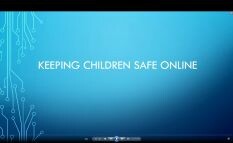E-Safety
At Alexandra Park Primary School, providing your child with the highest level of Care is always our highest priority and something we are immensely proud of. Working together with parents, there is lots we can do to help all children stay safe while online.
According to UNICEF, digital media has become the primary means through which young people play, communicate, receive, create, share information, and express themselves. In the UK, children aged between 5‐16 years spend an average of 6.3 hours on a screen per day. While there are endless positives to the technology available to us all, children may occasionally have to deal with a variety of challenging issues.
With constantly changing technologies, new trends starting regularly and children engaging in activities which are alien to many parents, it can all feel a bit too much. As a school, we are here to support all our families to ensure all our children stay safe while online.
We have collated a range of support materials below to help you understand how best to support your children’s online activities. Please do feel free to get in touch with school at any time if you have any questions or concerns.
Please watch the following video presentation by Headteacher, Mr Brooke, on the latest E-Safety issues.
 Top tips
Top tips
- Talk to your child about what they’re up to online. Be a part of their online life; involve the whole family and show an interest. Find out what sites they visit and what they love about them. If they know you understand, they are more likely to come to you if they have any problems.
- Take an interest in what they are doing. Just like you might if they started a new sport or musical instrument, ask them questions about it. If they are playing games online, play with them. This will make it easier to have conversations if any problems arise.
- Set boundaries in the online world just as you would in the real world. Be clear about what your child can and can’t do online – who they communicate with, where and when they can use the internet, how much time they can spend online, the sites they can visit and the type of information they can share.
- Use parental controls on devices that link to the internet, such as the TV, laptops, computers, games consoles and mobile phones. Parental controls are not just about locking and blocking, they are a tool to help you set appropriate boundaries as your child grows and develops. They are not the answer to your child’s online safety, but they are a good start and they are not as difficult to install as you might think.
- Search safely If you let your child search independently, make sure safe search is activated on Google and other search engines, as well as restricted mode on YouTube. You can set your default search to one designed specifically for children, such as Swiggle, and can save time by adding these to your Favourites.
- Check if it’s suitable The age ratings that come with games, apps, films and social networks are a good guide to whether they’re suitable for your child. For example, the minimum age limit is 13 for several social networking sites, including Facebook, Instagram, Snapchat and TikTok.
- Talk to siblings It’s a good idea to talk to any older children about what they’re doing online and what they show to younger children. Encourage them to be responsible and help keep their younger siblings safe.
- Stay involved Encourage them to use their tech devices in a shared space like the lounge or kitchen so you can keep an eye on how they’re using the internet and also share in their enjoyment.
